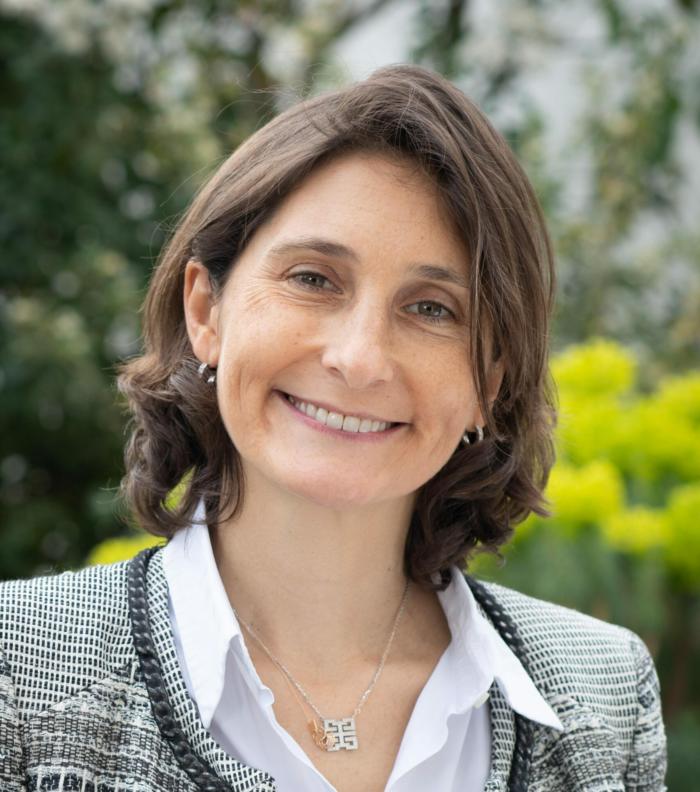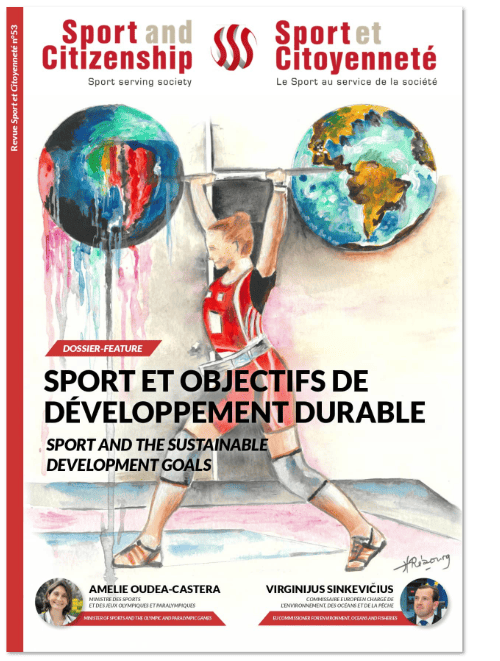“Stimulate a shared drive and commitment from
Member States towards green, sustainable sport”
The French Presidency of the European Union (PFUE) devoted a lot of its work to the subject of green, sustainable sport. Amélie Oudéa-Castera, French Minister for Sport and the Olympic and Paralympic Games, gives an assessment of measures taken and their medium-term outlook.
 In an uncertain geopolitical context, what were the PFUE’s priorities in the field of sport?
In an uncertain geopolitical context, what were the PFUE’s priorities in the field of sport?
AOC: Faced with the increasingly visible and alarming signs of climate change which now pose a direct threat to sport and its stakeholders, the Minister for Sport and the OPG wanted the Presidency to focus on green, sustainable sport.
This is a response to the demands of the sport sector, where there is growing awareness of the urgent need to see all forms of sporting activity, regulated or not, take more account of environmental requirements. We hope to encourage this evolution at the European level, by driving a new look at what Member States, the European Commission and the sport movement can do to contribute to this transformation.
The two conferences held at the beginning of 2022 unsurprisingly reaffirmed the need to make sport and its stakeholders part of the EU’s environmental and climate strategy, the “European Green Deal”. Unfortunately, the subject of coordinating Member States’ positions following Russia’s unjustified invasion of Ukraine has also been a priority since the end of February. France led this work, which enabled Member states to confirm their unanimous support for measures taken by the sport movement, including the IOC and international federations, to exclude all competitions in Russia and Belarus, and ban Russian and Belarusian athletes who represent their country officially from competitions held in EU territory. This also furnished the opportunity in Council to emphasise vigorously the sporting values upheld by the EU and its Member States, while expressing support for Ukraine.
What influence can the Conclusions on “sport and physical activity, a promising lever to transform behaviour for sustainable development” adopted by the “Sport” Council in April 2022 bring to bear?
AOC: Some actors in the sport sector have already been looking at the question of reducing sport’s ecological footprint for several years. However, there is no shared strategy at the European level between the different stakeholders. This issue had never been the subject of conclusions or recommendations from the Council, either, until now. That is why we felt it would really add value if we adopted recommendations on this subject in order to stimulate a shared drive and commitment from Member States. Although the text is an agreement and not binding, it remains innovative and ambitious, because it not only suggests avenues to reducing sport’s impact on the environment, but also shows how sport can be a driving force for transforming behaviour, through the positive values it conveys and its wide media coverage.
This text sends a strong political signal to the European sport movement, by showing the need for involvement and coordination from all the stakeholders. Nevertheless, its influence will also depend on how the actors involved ensure that the recommendations are followed. I am delighted that the Czech Republic, which took over from France as President of the Council of the EU, has chosen to deal with the topic of sustainable, accessible sports facilities, which will continue and extend the work begun. The coordinating role of the Commission will also be important, particularly in the framework of the High-Level Expert Group on Green Sport. In France, the Prime Minister will be presenting a plan for responsible use of energy at the beginning of October, with the aim of reducing our energy consumption by 10% by 2024, in comparison with 2019, which will include measures taken from the plan for responsible behaviour in sport, which I am jointly piloting with the Minister for Energy Transition. In parallel, following the Olympic and Paralympic Committee meeting on 25 July, work is soon to begin, with the Ministries of Energy Transition, Regional Cohesion, Health, the Interior and the Overseas Territories, on elaborating a national plan for adapting sport to the changing climate, and this will be published before Summer 2023. We are moving forward, and the sport sector is playing its full role.
These conclusions insist on sport as a lever for educating about the Sustainable Development Goals (SDGs) and acting on them. How can this aspect be reinforced?
AOC: The Conclusions certainly fit into the framework of the United Nations Agenda 2030, and throughout the text, references are made to the SDGs where sport, because it conveys the finest universal values, particularly Olympic values, can make a contribution: in particular, access to health, quality education and gender equality.
Quite simply because it is an educational force, from the earliest age, for personal development, confidence, meeting others and learning to live together. One could even echo Michel Serres and hope that sport can be “placed at the heart of education (…) because the body is at the heart of individual development, both in life and at work”.
Among the measures to be taken to reinforce this aspect, I’ll focus on the question of training for sport teachers and instructors, employees in sport, athletes and managers of sports facilities. In my opinion it would be a good idea to look at integrating specific learning modules in training programmes.
Sports which take place outside or in nature, particularly cycling and swimming, can also contribute to teaching people about the environment, as they enjoy experiences which can make them more sensitive to water issues or soft means of transport.
How can organisers be encouraged to plan more ecologically responsible events?
AOC: Society’s approval of sporting events, in particular major international events, is now closely linked to their ecological footprint and their social and environmental legacy.
There are many avenues for action: imposing conditions when MISEs or public funding are awarded, integrating social responsibility criteria into contracts with the partners involved (companies selected as traders, suppliers, sponsors or the media), supporting athletes who want to do something to make their sport greener, the development of environmental impact studies and mechanisms for counteracting damaging effects, but these require specific skills and dedicated funding.
For this reason, the Ministry decided to support events organisers by offering them a common framework of objectives to attain: the Charter of 15 Environmentally Responsible Commitments, elaborated by our Ministry in 2017 and already adopted by over 350 international, national or local events in its first version. I hope to be able to generalise this tool, and with this in view, I am pleased to say that more than 40 organisers have already signed the second, more demanding, version, which came out at the end of 2021. Among them, sporting event organisers and about fifteen federations can be found.
France has already assumed its responsibilities. In organising the Rugby World Cup to be held next year, France 2023 has made strong ecological commitments, including acting for a sustainable, circular economy, and reducing its impact on the environment. Above all, in two years’ time, France is organising the most environmentally friendly Olympics in history, dividing the carbon footprint in half compared with previous events. It will even be the first Olympics with a positive carbon impact, thanks, partly, to the determination of Paris 2024, which is dedicating a substantial budget to supporting carbon positive projects in France and abroad: agriculture and eco-tourism in Guatemala, solar energy in Senegal and reforestation in Indonesia; and also thanks to SOLIDEO’s exceptional ingenuity. In its construction schemes it has chosen very innovative materials and techniques which will place us ten years ahead in achieving the objectives of the low carbon strategy.
Apart from major events, what can be done with amateur sport clubs?
AOC: You are right, in order to have a really big impact, account needs to be taken of sustainable development and eco-responsibility at every level, from MISEs to local events run by amateur clubs, particularly events targeting young children, since, as I have said, sport is an excellent force for teaching about sustainable development.
Amateur clubs, which usually rely heavily on volunteers, often lack the money and skills needed to apply sustainability strategies. It is therefore vital that we maintain a dynamic volunteering sector, which is the strength of the whole of the sport sector. The President of the Republic has made strong commitments to ensuring the safety of this status, especially by ending the situation where directors of associations were held responsible when a simple mistake was made in club management. I hope that we will go further together, towards better recognition of the wealth represented by the commitment of the 3.5 million volunteers in our country, by giving them a new boost.
I am a strong believer in the force of example and sharing good practice between peers. I am glad to see that a lot of resources designed for different groups of people are beginning to spread. Some good examples are the number of collections of initiatives from signatories to the Charter of 15 Commitments, the actions of federations, or Paris 2024’s legacy and sustainability plan, which suggests solutions, tools and methods for meeting these challenges in a concrete way throughout the country.
I would also like to mention the work done by the Ministry at a European event held in April on the theme of “zero waste and low carbon sporting events”, where experiences were discussed between peers. Particular attention was given to “small sporting events”, which do not always have the same concerns and resources as MISEs. A deliverable consisting of a methodology guide and a collection of European initiatives is being prepared. I hope it will be useful for sport clubs and federations of every size, to guide them in their actions, whatever their scale of implementation.
Interview by Julian Jappert
Find this article and more in our special magazine “Sport and ODD”!







 INSCRIPTION
INSCRIPTION
 CONTACT
CONTACT FACEBOOK
FACEBOOK